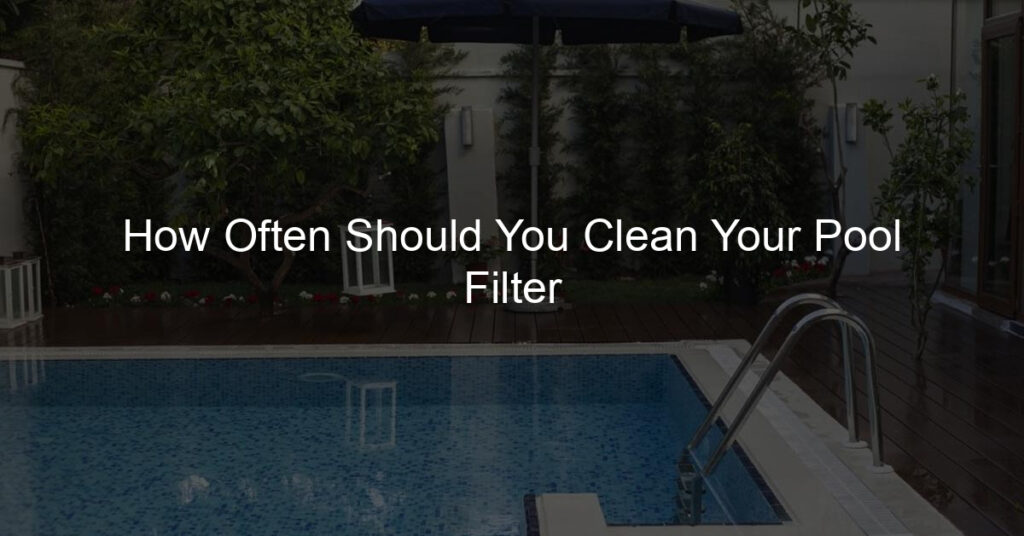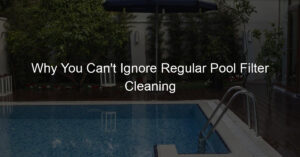Importance of Regular Pool Cleaning
A swimming pool is an oasis of relaxation and enjoyment, but it requires regular maintenance to preserve its integrity. Ignoring this responsibility can result in several issues, including cloudy water, algal bloom, and even equipment failure. Regular cleaning not only improves the pool’s aesthetics but also prevents potential health hazards such as bacterial growth, thus ensuring a safer swimming environment for all.
Skimming: A Daily Necessity
Skimming is the act of removing leaves, bugs, and other debris from the water surface. It’s a simple process involving a net attached to a long pole, and should be performed daily. Regular skimming makes your pool more inviting and reduces the need for chemicals. It also prevents debris from sinking to the bottom of the pool, which would complicate vacuuming.
Brushing: A Weekly Duty
On a weekly basis, it’s important to brush your pool’s walls, floor, and steps. This removes any accumulated algae and prevents stains. Different types of pools require different brushes; stainless steel for concrete, nylon for vinyl or fiberglass. Ensure you’re using the right type to prevent damage.
Vacuuming: A Weekly Task
Just like brushing, vacuuming your pool should be a weekly task. This process helps remove debris that has settled at the bottom. Manual vacuums are effective but time-consuming. Automatic pool vacuums are a worthy investment for larger pools, making the job easier and more efficient.
Testing and Balancing Water Chemistry: Essential Weekly Check
To keep your pool safe and clean, test the water at least once a week. You need to check the pH levels, alkalinity, and chlorine concentration. Ideal water chemistry balances help prevent algae growth and ensure the effectiveness of sanitizing chemicals, thus protecting your pool’s surfaces and equipment.

Cleaning Pool Filters: Monthly Maintenance
Pool filters work tirelessly to keep your water clear by trapping small debris. Clean these filters at least once a month. There are three types of filters: sand, cartridge, and DE (Diatomaceous Earth). Each requires a different cleaning method, so it’s crucial to know which one you have.
Checking Pool Equipment: Monthly Inspection
While cleaning your pool, don’t overlook the equipment. Pumps, heaters, skimmers, and return jets should be inspected monthly for any signs of wear or damage. Proper function of these parts is crucial for overall pool health and longevity.
Shocking the Pool: Necessary Every Two Weeks
Shocking refers to drastically raising the chlorine levels for a short period to kill bacteria. It’s a vital process to maintain water clarity and prevent eye and skin irritation. This is typically done every two weeks, but may be required more frequently if the pool is heavily used.
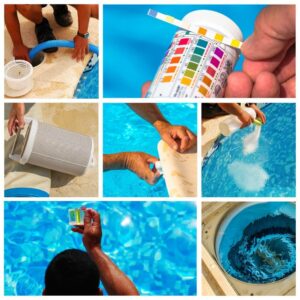
Pool Cleaning during Peak Usage
During peak swimming seasons, the pool will require more attention. More swimmers mean more sunscreen, oils, and bacteria entering the water. This may require additional shocking and more frequent water testing to ensure a safe, clean swimming environment.
Pool Cleaning during Low Usage
During periods of lower usage, your pool still needs care. Regular skimming, vacuuming, and chemical balancing are essential to keep the water clear and ready for use. Reduced usage periods may allow you to shock less frequently, but it’s important to maintain a regular cleaning schedule.
Pool Cleaning in Different Seasons
Depending on your location, the seasons may greatly affect your pool cleaning routine. In colder months, you might need to winterize your pool, while warmer months call for more regular cleaning due to increased use. Knowing how to adjust your pool maintenance schedule per season is key to extending your pool’s lifespan.
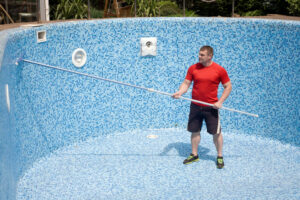
Addressing Algae Growth
Algae are one of the biggest problems pool owners face. They can turn a pool green overnight if not addressed. Regular brushing, vacuuming, and maintaining proper water chemistry are your first line of defense. If you see signs of algae, immediate action is required, including more frequent brushing, shocking, and potentially using an algaecide.
Pool Cleaning Services: A Viable Alternative?
For those with a busy schedule or who prefer to avoid the hands-on work, professional pool cleaning services are available. These services can be scheduled weekly, biweekly, or monthly, depending on your needs. They handle all aspects of pool maintenance, providing a hassle-free option for pool owners.
Advanced Pool Cleaning: Yearly Inspection
Once a year, your pool should be given a thorough inspection. This includes checking for leaks, examining the pool’s structural elements, and ensuring all equipment is functioning properly. Some of this can be done during your monthly checks, but a dedicated, thorough examination can help catch issues before they become major problems.
Essential Tools for Pool Cleaning
Regular pool cleaning requires the right tools. A pool skimmer, brush, and vacuum are basics. You’ll also need a water testing kit to check chemical levels. Other useful items include a pool cover to reduce debris and evaporation, a pole for reaching across the pool, and a pool filter cleaner.
| Maintenance Task | Frequency | Details |
|---|---|---|
| Skimming | Daily | Removes debris from water surface |
| Brushing | Weekly | Removes algae from walls, floor, and steps |
| Vacuuming | Weekly | Removes settled debris from the bottom |
| Water Chemistry Testing | Weekly | Ensures safe and balanced water chemistry |
| Cleaning Pool Filters | Monthly | Keeps filters effective in trapping debris |
| Equipment Inspection | Monthly | Checks for any signs of wear or damage |
| Shocking | Every Two Weeks | Kills bacteria and maintains water clarity |
| Seasonal Maintenance | Varies | Adjusts cleaning routine according to the season |
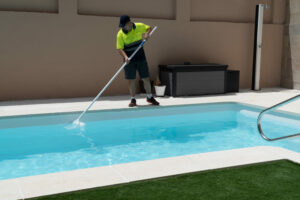
Conclusion
Maintaining a clean pool is essential for its longevity and the health of its users. This involves daily, weekly, and monthly tasks that include skimming, brushing, vacuuming, testing water chemistry, cleaning filters, and checking equipment.
The frequency of some tasks may increase during peak usage and warmer seasons. However, services exist for those who prefer professional maintenance. Regardless of who handles the cleaning, a well-maintained pool provides an inviting and safe environment for relaxation and enjoyment.

